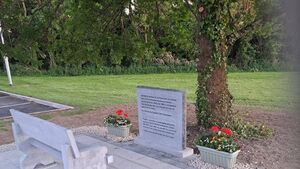Strong support as Laois bids to host National Famine Commemoration

The memorial stone for John Fitzgerald and all those buried in the grounds of the former Abbeyleix Workhouse, which was installed by the Tonduff Cillín committee. File image
A BID to make Abbeyleix the host town for next year’s National Famine Commemoration has received unanimous support from Laois county councillors.
Despite a history that sadly reflects the devastation of the Great Famine, Laois has never hosted the annual memorial event that is held on the third Sunday in May.
At the latest meeting of Laois Co Council, Cllr Marie Tuohy got unanimous support for her proposal that a letter be sent to Minister Patrick O’Donovan, requesting that Abbeyleix be designated as host venue in 2026.
“Let Abbeyleix be the place where Ireland gathers to remember,” said Cllr Tuohy, during a poignant address at the council meeting. The proposal was seconded by council cathaoirleach Cllr Barry Walsh.
The proposal was requested by the Tonduff Cillín committee in Abbeyleix, which has worked on projects that include the Reflection and Remembrance Garden at Heritage House and the installation of a memorial stone at the tragic cillín in nearby Tonduff, where unbaptised babies were buried in non-consecrated ground for generations.
The 2025 National Famine Commemoration was held in Kilmallock, Co Limerick, with an address by then-President Michael D. Higgins, military honours and a wreath-laying ceremony.
Cllr Tuohy described the Great Famine of 1845-1852 as “the single most devastating event in modern Irish history”, when one million people died and a further one million emigrated to Britain, the US, Canada and Australia.
The Labour councillor said: “Workhouses became overcrowded, disease spread rapidly and entire rural communities were emptied. The famine reshaped Ireland permanently, socially, culturally and politically. Laois, then Queen’s County, experienced a sharp decline in population.”
Describing Abbeyleix as an ideal venue for the national day of mourning and remembrance, she said: “Abbeyleix stands as one of the most historically fitting and symbolically powerful places in Laois to host the annual Famine Commemoration. Abbeyleix suffered the same hunger, hardship and loss that swept the country.
“The De Vesci family are remembered locally for their active role in helping the population during the famine. The fountain in Market Square stands as a memorial.”
She added: “Let’s be clear, the famine didn’t end in 1852, it lingered in the lives of the poor, the displaced and the forgotten. Abbeyleix wasn’t just a place of suffering in the 1840s, it remains a witness to its aftermath for decades.
“The Tonduff Cillín and the Gate to Heaven are ancient burial sites which are now marked and honoured. The memorial stone and reflection seat at the back of the hospital marks history, including the life of six-year-old John Fitzgerald who died of hunger and neglect on the roadside on 31 May, 1886. He was seen days before his death, frail and failing in his mother’s arms.
“In 2026, we will mark 181 years since the beginning of The Great Famine. Abbeyleix is ready, it has the history and the stories and has made huge efforts to publicly acknowledge and remember those times in history. Their efforts should be recognised by selecting them as the 2026 venue to host the Irish Famine Commemoration in May.”
The proposal was widely supported in the council chamber. Cllr John King suggested that the event could incorporate Donaghmore Workhouse, which housed some of the county’s most desperate people after it opened in 1853. Now the Donaghmore Workhouse and Agricultural Museum, he said the landmark building could have a role if the national commemoration were held in Laois.
Welcoming the council’s unanimous support, local historian Noel Burke of the Tonduff Cillín committee said: “Abbeyleix remembers John Fitzgerald. And in 2026, we ask that the Irish nation remember with us.
“Let Abbeyleix be the site of the National Famine Commemoration, not only because of what happened here in the 1840s but because of what happened here in 1886. Because famine does not end with the lifting of a blight. It ends when every child is safe, seen and sheltered.”
A council official confirmed that a letter regarding the Abbeyleix proposal would be sent to Minister O’Donovan at the Department of Tourism, Culture, Arts, Gaeltacht, Sport and Media.




